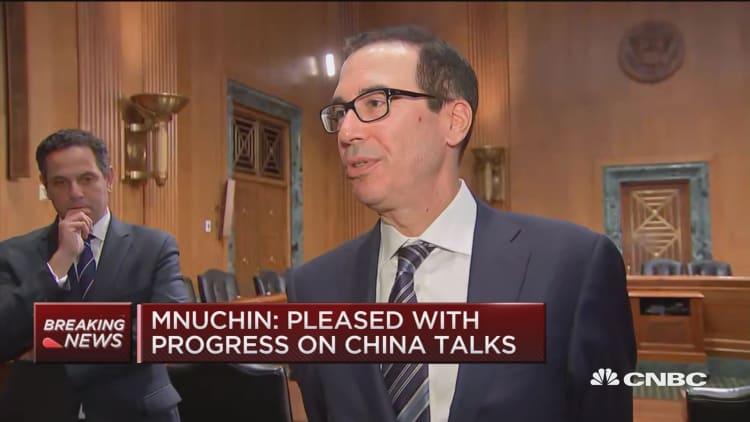China's rush to pass a new foreign investment law on Friday is likely not enough to appease the demands of the U.S. in ongoing trade negotiations, analysts said.
Beijing's largely symbolic National People's Congress ended Friday with a ceremonial endorsement of a law that addresses specific issues the foreign business community has long complained about. The new rules prohibit the forced transfer of technology from foreign-invested businesses in China, step up protection of intellectual property and claim to give the companies equal footing with domestic players, according to publicly available materials.
"It's trying to address some of the concerns that are being raised (in the trade talks)," Andrew McGinty, partner at law firm Hogan Lovells, said in a phone interview with CNBC on Friday.
"'OK,' (China says,) 'We hear what you say. Here is a clear attempt to translate those concerns into legislation,'" McGinty said. "It's a step in the right direction. But the trade tensions are wider than that. They're historical."

Following increasing frustration by foreign businesses about their ability to compete fairly with Chinese companies, the U.S. and China became embroiled in trade tensions last year.
Under U.S. President Donald Trump, the rhetoric about the spat initially focused on the American trade deficit with China. That resulted in the application of tariffs on $250 billion worth of imported goods from China, to which Beijing countered with duties on $110 billion worth of goods from the U.S. In the last several months, the negotiations between both sides have increasingly centered on issues of intellectual property protection and claims of forced technology transfer.
Little detail about progress on the talks has been made public. On Friday, Chinese state media said leaders of both trade delegations held a phone call in the morning Beijing time and made "substantial progress."
A few hours later, the symbolic gathering of delegates endorsed the new foreign investment law. It took just about three months from the time the NPC Standing Committee began soliciting comments on its first draft.
"It's rushing this through," Lester Ross, chair of the policy committee of the American Chamber of Commerce in China, said in a phone interview with CNBC on Thursday. "It's not giving this adequate time for public comment from AmCham (and foreign businesses).The law is drafted in a pretty general way."
Ross also noted the draft gave China the right to retaliate against a particular country for restricting Chinese companies there. "The law offers a more broad-based retaliation," said Ross, who is also partner at law firm Wilmer Cutler Pickering Hale and Dorr.
Such a clause essentially reinforces the unequal footing that foreign and Chinese companies have in accessing each others' countries. U.S. companies have complained that they get less access in China than Chinese companies have in America.
But the Chinese government is clearly trying to show it has the interests of foreigners in mind. At the last minute, Beijing even added new language that provides further protection of foreign company commercial and trade secrets, according to a final draft reviewed by the U.S.-China Business Council.
"The addition of language imposing criminal penalties for sharing sensitive foreign company information adopts a much tougher deterrent against counterfeiting and (intellectual property) theft and will offer new avenues for the enforcement of (intellectual property) protection," Jake Parker, vice president of China operations at the U.S.-China Business Council, said in a statement.
He noted the council is "pleased" with the new language. He cautioned that "enforcement will be the key metric for evaluating success, but the business community has collectively advocated for years for the Chinese government to impose criminal penalties for (intellectual property) infringement, we need to recognize this positive progress to that end."
The law is set to be implemented on Jan. 1, 2020. It's expected to abolish three existing regulations on equity joint ventures, wholly foreign-owned enterprises and contractual joint ventures, according to an English translation of the draft on China Law Translate.
In all, for foreign businesses already eyeing opportunities to profit off the world's second-largest economy, the law does give them more incentive to enter China, Ross said: "It is moving in a good direction. It doesn't go nearly far enough."


